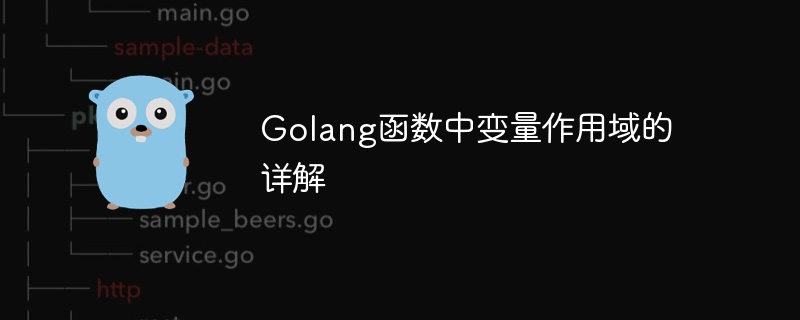Home >Backend Development >Golang >Detailed explanation of variable scope in Golang functions
Detailed explanation of variable scope in Golang functions
- WBOYWBOYWBOYWBOYWBOYWBOYWBOYWBOYWBOYWBOYWBOYWBOYWBOriginal
- 2023-12-23 09:57:50811browse

Detailed explanation of variable scope in Golang functions
In Golang, functions are basic code blocks used to complete a specific task or calculation. Variables defined inside a function have a specific scope, that is, in which code segments the variable is visible and available. This article will discuss the scope of variables in Golang functions in detail and provide specific code examples.
- Local scope
Local scope means that the variable is defined inside the function and is only visible and available inside the function. When the function completes execution, the life cycle of local variables also ends. Here is an example:
package main
import "fmt"
func main() {
// 函数内部定义的变量
var num int = 10 // 局部变量
fmt.Println(num) // 输出:10
// 在函数内部定义的变量只在函数内部可见
fmt.Println(other) // 编译错误:undefined: other
}
In this example, num is a local variable defined inside the main function. Can only be used inside the main function. In the fmt.Println(num) statement, we can correctly output the value of num. However, in the fmt.Println(other) statement, the compiler will report an error because the other variable does not exist inside the main function.
- Scope of function parameters
Function parameters also have local scope, they are only visible and available inside the function. Here is an example:
package main
import "fmt"
func square(num int) {
// 函数参数num是一个局部变量
fmt.Println("平方数为:", num*num)
}
func main() {
square(5)
}
In this example, the square function has a parameter num. Inside the function, we can access and use the num variable. When calling square(5) in the main function, 5 is passed as a parameter to the square function, so the output result is the square number: 25.
- Global scope
Global scope means that variables are visible and available anywhere in the program. Global variables are defined outside the function and can be accessed and used inside and outside the function. Here is an example:
package main
import "fmt"
var name string = "Alice" // 全局变量
func main() {
fmt.Println("姓名:", name) // 输出:Alice
changeName()
fmt.Println("姓名:", name) // 输出:Bob
}
func changeName() {
name = "Bob" // 修改全局变量的值
} In this example, we define a global variable name and use it in the main function and changeNameUse and modify its value in the function. In the main function, we can correctly output the value of the global variable name. In the changeName function, we modify the value of the global variable name to "Bob". Finally, output the value of the global variable name in the main function again and find that it has been changed to "Bob".
- Block-level scope
In Golang, there is no explicit support for the concept of block-level scope. For example, variables defined in conditional statements or loops are also visible and visible within the entire function scope. usable. Here is an example:
package main
import "fmt"
func main() {
for i := 0; i < 5; i++ {
// for循环中定义的变量也在整个函数内可见
fmt.Println(i)
}
// 在循环外部仍然可以访问i
fmt.Println("最终的i值:", i) // 编译错误:undefined: i
}In this example, we have defined a variable i inside the for loop. We can access and use i variables throughout the main function scope. But when trying to access i outside the loop, the compiler will report an error.
Summary
The variable scopes within functions in Golang include local scope and function parameter scope. Local variables and function parameters are only visible inside the function. Global variables have global scope and are visible and available anywhere in the program. Golang does not support the concept of block-level scoping, such that variables defined in loops or conditional statements are visible throughout the function scope. Knowing and understanding the concept of variable scope is important to writing readable and maintainable code.
The above is the detailed content of Detailed explanation of variable scope in Golang functions. For more information, please follow other related articles on the PHP Chinese website!

